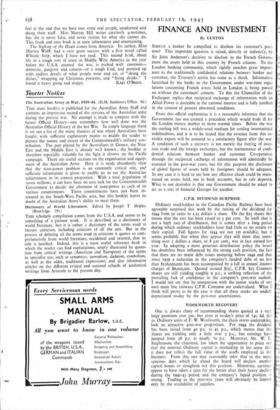FINANCE AND INVESTMENT
By CUSTOS
SHOULD a banker be compelled to disclose his customer's posi- tion? This important question is raised, directly or indirectly, by Sir John Anderson's decision to disclose to the French Govern- ment the assets held in this country by French citizens. To the London banking community, which rightly attaches great import- ance to the traditionally confidential relations between banker and customer, the Treasury's action has come as a shock. Information furnished by the banks to the Government under war-time regu- lations concerning French assets held in London is being passed on without the customers' consent. To this the Chancellor of the Exchequer• replies that reciprocal exchange of information with an Allied Power is desirable in the national interest and is fully justified in the context of present abnormal conditions.
From this official explanation it is a reasonable inference that the Gevernment has not created a precedent which would bode ill for the London money market in more normal times. Before the war the sterling bill was a widely-used medium for settling international indebtedness, and it is to be hoped that the revenue from this in- visible export will be restored to a satisfactory figure after the war. • A condition of such a recovery is not merely the freeing of over- seas trade and the foreign exchanges, but the maintenance of confi- dential relations between banker and customer. Co-operation through the reciprocal exchange of information will admittedly be essential in the post-war years, but for this purpose the disclosure of global figures of assets held by foreigners should be adequate, In any case it is hard to see how any effective check could be main- tained on assets held, not in bank accounts, but in safe deposits. What is not desirable is that one Government should be asked to act as a sort of financial Gestapo for another.
C.P.R. DIVIDEND SURPRISE
Ordinary stockholders in the Canadian Pacific Railway have been agreeably surprised this week by the raising of the dividend for 1944 from 5o cents to 1.25 dollars a share. On the $25 shares this means that the rate has been raised to 5 per cent. In itself that is not a high rate of distribution, but it comes after a long period during which ordinary stockholders have had little or no return on their capital. Full figures for 1944 are not yet available, but it. seems probable that when they appear they will show that some- thing over 2 dollars a share, or 8 per cent., was in fact earned last year. In adopting a more generous distribution policy the board has doubtless been influenced by. the strong cash position, the fact that there are no major debt issues maturing before 1949 and that since 1939 a reduction in the company's funded debt of no less than $126,000,000 has been accompanied by a fall in annual interest charges of $6,000,000. Quoted around $151, C.P.R. $25 Common shares are still yielding roughly 9 p.c., a 'striking reflection of the prevailing lack of confidence in the company's post-war outlook. I would not say that by comparison with the junior stocks of our own main line railways C.P.R. Common are undervalued. What I think will prove to be the case is that all these stocks are unduly depreciated to-day by the post-war uncertainties.
WOOLWORTH RECOVERY
One is always chary of recommending shares quoted at a very large premium over par, but even at to-day's price of 74s. 6d. the 5s. Ordinary units of F. W. Woolworth, the chain stores undertaking, look an attractive post-war proposition. For 1944 the dividend has been raised from 4o p.c. to 45 p.c., which means that the shares are yielding only a little over 3 p.c., but earnings have jumped from 58 p.c. to nearly 7o p.c. Moreover, Mr. W. L. Stephenson, the chairman, has taken the opportunity to point out that the nominal Ordinary capital is misleading in the sense that it does not reflect the full value of the assets employed in the business. From this one may reasonably infer that in the more spacious days which lie ahead the board will declare another capital bonus to straighten out this position. Meantime, earnings appear to have taken a turn for the better after their heavy decline during the 1940-43 period and the company's liquid position is strong. Trading in the post-war years will obviously be limited only by the availability of supplies.


























 Previous page
Previous page